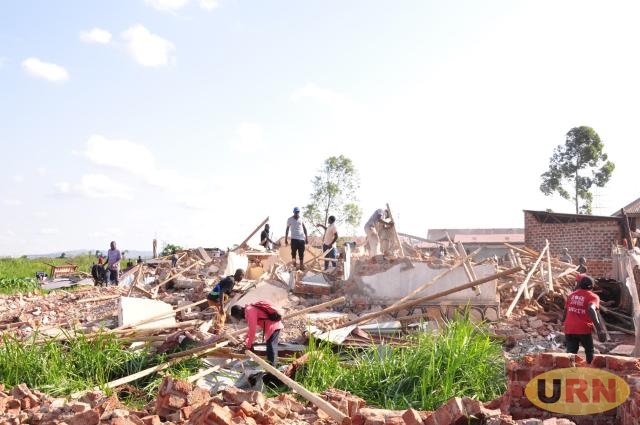
Kampala, Uganda | THE INDEPENDENT | The National Environment Management Authority-NEMA’s move to restore the Lubigi wetland has escalated into a controversy, with many activists saying they have been marred by human rights abuses.
Amidst NEMA’s drive to reclaim the wetland, there is a growing concern from the public, human rights defenders, and Civil Society Organizations on how the process was executed.
Human rights activists Led by Andrew Byaruhanga the Executive Director, of Resource Rights Africa, argue that while NEMA has a legal duty to safeguard the environment, its methods have disregarded the fundamental rights and well-being of the affected communities.
“Established UN international good practices outlaw and denounce “forced evictions” unless carried out under specific circumstances, requiring the government to ensure several requirements are observed,” Byaruhanga said.
Byaruhanga emphasized that NEMA should have undertaken several measures to mitigate the current human rights violations, such as preventing people from becoming homeless or vulnerable to further rights abuses.
Byaruhanga further cited the case of James Muhindo and others vs Attorney General. In the said case, the court ruled that the government’s lack of clear procedures before, during, and after evictions violates human rights and undermines obligations to uphold rights under the Covenant on Economic, Social, and Cultural Rights.
To him, remedial actions could include exploring alternative eviction methods to reduce or eliminate the need for force, as well as ensuring adequate compensation for any affected property, both personal and real.
“…in those cases where evictions are considered justified, they should be carried out in strict compliance with the relevant provisions of international human rights law and by the general principles of reasonableness and proportionality,” he added.
In recent weeks, NEMA with help from police and army made forceful evictions aimed at expelling all unauthorized inhabitants from the wetland area. Homes have been demolished, leaving several individuals homeless and their properties destroyed.
Livelihoods have been disrupted, resulting in children from affected families being unable to attend school, among other pressing concerns.
Official records from the environmental body indicate that 214 households had already been evicted, with plans to evict 101 more, totaling 315 affected households.
Under Section 55 of the National Environment Act, 2019, encroaching on wetlands is deemed illegal and carries severe penalties, including a maximum sentence of 12 years in jail, a fine of up to 600 million Shillings, or both upon conviction.
Despite this, NEMA is empowered to enforce these regulations, which include the removal of individuals from wetlands. Before NEMA can initiate eviction proceedings, they issue a Restoration Order by Section 133 of the National Environment Act, 2019.
The order grants encroachers 21 days to restore the wetland to its original state and vacate the premises, or to appeal the order in court. If the encroacher fails to comply within the specified timeframe, NEMA is authorized to use force to remove them and restore the area, with the costs borne by the violator.
Victims have reported that NEMA did not provide them with any eviction notices. Erias Lukwago, Kampala City Lord Mayor, echoed these concerns during his visit to Bwaise III village, labeling the ongoing evictions as illegal.
Lukwago criticized NEMA for failing to issue proper notices to the affected individuals. He called upon the environmental authority to immediately cease operations until all existing legal discrepancies could be addressed and resolved.
Hussein Kato Muhinda, Executive Director of Earth and Rights Initiative, called upon NEMA to present concrete evidence of the alleged notices they claim to have distributed to residents. He emphasized the necessity for transparency and accountability in the eviction process, urging NEMA to substantiate their actions with clear and documented proof.
“If NEMA ever shared any notice with the residents as they claim, let them present them. They have been active in sharing various updates on their social media platforms, so they should also share these notices,” said Muhinda.
In the face of the human rights abuse accusations, Dr. Barirega Akankwasah, Executive Director of NEMA, sees those accusing the authority as unfair saying that the authority followed the Restoration processes but several people kept a deaf ear.
“This same process was duly followed for Lubigi operation and Restoration Orders were issued and people were warned to leave from as far as Feb-April 2016 for Nansana, 2018 Nabweru area, 2019 Nabisasiro, Aug 2022 – Nansana, Sentema, Busega and Nabisariso, Dec 2023 Busega and April 2024 Lubigi Generally. Earlier in 2012, major evictions were carried out in Lubigi which resulted in successful evictions of Bemba Musota (the witchdoctor) and the taxi park,” Akankwasah said.
The Executive Director added that satellite images and other monitoring data indicate that the majority of encroachments in the wetland began between 2011 and 2015, with evictions and subsequent re-entry attempts continuing from that period to the present day.
This statement comes amidst claims from several individuals who assert they have occupied these areas since as early as 1999, backed by documentation from Nansana Municipality and the Buganda Kingdom.
Regarding compensation, Akankwasa stated that while the evicted encroachers are requesting to be paid, according to Section 133 of the National Environment Act, 2019, they would typically be responsible for compensating the government for the costs of restoration.
“Government cannot therefore compensate encroachers as this would not only invite more encroachments but also would be a tacit approval of illegality,” he added.
While most people do not oppose evictions, there are concerns about human rights abuses. Additionally, there is growing concern about selective eviction, which disproportionately affects the poor while leaving the rich and well-connected untouched.
For example, questions have arisen regarding why establishments like Stabex Petrol Station and factories belonging to Mandela Millers and Kumbocha Products remain untouched in the middle of the same wetland area. Similar issues were raised during previous evictions carried out by NEMA.
However, Barirega Akankwasah said that some infrastructure in wetlands was established with due process of Government approval, and removing them would result in liability to the Government.
“Fuel station Lubigi which obtained approvals in 2017. There are some other establishments with past approvals including some factories. These have been left until the Government decides on such cases. The public should not see this as selective enforcement but rather prudence to avoid loss of public funds in avoidable compensations,” he added.
Before 2021, NEMA issued licenses for various activities in wetlands. This practice ceased when the President ordered NEMA to stop granting licenses or renewals for activities in wetlands, except critical public infrastructure.
However, NEMA officers speaking to the URN in 2018 clarified that they had not issued any licenses for operations in wetlands except for the National Water and Sewerage Corporation.
The encroachment on Uganda’s wetlands remains a significant concern. From 1994 to 2019, the wetland cover decreased from 15.6% to 8.9%, with recent assessments showing a slight improvement to 9.3%. Statistics from the Environment Ministry indicate that Uganda loses 2.5% of its wetlands annually. Without intervention, it is projected that by 2040, only 1.6% of the wetlands will remain.
The Uganda Wetlands Atlas highlights that wetland destruction costs the country approximately 2 billion Shillings annually. Furthermore, contamination of water resources, exacerbated by reduced wetland buffering capacity near open water bodies, costs the country 38 billion Shillings annually.
****
URN
 The Independent Uganda: You get the Truth we Pay the Price
The Independent Uganda: You get the Truth we Pay the Price




Lubigi
This river or stream has small streams that join to create the big picture
We are interested in accounting for them and establishing the I dividials who converted them into land for construction .
We are also interested in the circumstances that made individuals settle in the swamp, even when the lower parts of their houses looked wet through out the year
They discharged human waste and polythene paper plus other non biodegradable material into the swamps
There are many law abiding citizens in Uganda, who struggle to stay in the right places
Who are these persons who settled in the swamps
Who are the local leaders who closed an eye to this settlement. The vote hunting persons who cheer them on
It becomes unealistic that we allow people to break the law
Then implement corrective action
Then the issues of human rights are cited to protect or appease those involved in these acts
Calling upon the use of very limited resources
To respect the rights of those involved
When you are pointing to this expenditure, you are being unfair to the rest of the law abiding citizens
Whatever decisions are made by the powers that be,
Let Ugandans revert to behaviour of ordinary citizens
Let us avoid the vicious cycle of problems
How do we claim to love a place that we deliberately destroy?
For those who read a book covering a trip across East Africa in Primary School; we miss Uganda